The seventh annual Provincetown Book Festival concluded on Sunday with an event that might have given Florida Gov. Ron DeSantis an aneurysm. Titled “Banned Books, Banned People,” it featured local drag queens reading from some of the country’s most frequently banned books.
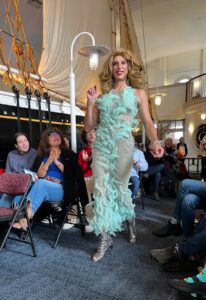
There was a hum of conversation and books being flipped open as an overflow crowd snagged seats around the Rose Dorothea at the Provincetown Public Library. Angie Galiano, who has lived in town for more than 40 years, said she wasn’t surprised that drag queens were standing up against book banning. “Drag queens have always been at the forefront of civil rights and equality,” she said.
Organizers passed out flyers detailing the disconcerting number of books currently being banned or challenged across the U.S. A book challenge is when a person — or, increasingly, a religious or political organization — demands that a school board or local government remove a book from a school or public library. According to the Office for Intellectual Freedom at the American Library Association (ALA), there were 2,571 titles challenged around the county in 2022 alone. That was an increase of 38 percent from 2021, which saw an unprecedented number of book challenges at 1,858 titles. Only 223 books were challenged in 2020; in 2015, the number was 190, and in 2010 it was 162.
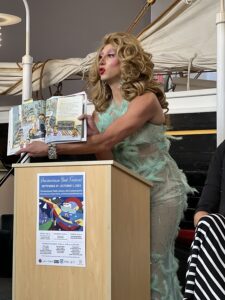
These censorship efforts have targeted books with LGBTQ subjects, which are often challenged as being too sexually explicit. The most challenged book in the U.S. in 2022 was Gender Queer: A Memoir by Maia Kobabe, a graphic story about the cartoonist author’s life as a nonbinary person. Many other books in the top 10 have LGBTQ themes, such as George M. Johnson’s All Boys Aren’t Blue, Mike Curato’s Flamer, and Jonathan Evison’s Lawn Boy. This uptick in censorship coincides with restrictions on drag performances in several states, which, like book bans, have been promoted as necessary to protect children from ‘grooming’ by sexual abusers. Some drag restrictions have already been deemed unconstitutional in federal court.
Attempts at book banning are more common in states with Republican-dominated state governments. According to the ALA, Texas led the charge with 2,349 titles challenged in 2022. But Massachusetts is not immune. The ALA reported that there were 45 attempts to restrict access to books in the Bay State, and 57 titles were challenged.
The Provincetown library is not taking books off its shelves anytime soon, but Nan Cinnater, the director and cofounder with Stephen Borkowski of the book festival, said it was necessary to take a stand against this national onslaught. “If librarians don’t educate about banned books, who will?” Cinnater asked, adding that including drag queens and banned books in one event was a way to “represent the folks under attack.”
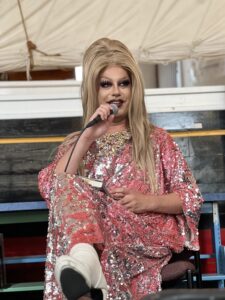
Anne Hutchinson, the 17th-century Puritan reformer who has been resurrected in Provincetown by Brent Thomas, gave the event’s opening speech. In 1637, Hutchinson was exiled from the Massachusetts Bay Colony to Rhode Island for her advocacy of a more personal relationship with the divine. “As someone with a few go-arounds with being banished,” she said, “I’m here to perhaps shed a little wisdom on the particularly American experience of banning voices.”
Hutchinson spoke of how, just as her century was obsessed with the concept of “proper behavior” and what would lead to damnation or salvation, we today are similarly closed in by the narrow walls of acceptability. Her own beliefs in a personal relationship with God, Hutchinson said, were freeing for herself and others, but the judges and ministers banned her voice because “they could not allow me to have my own reality because their personal fear of damnation required them to listen to rules written hundreds of years before them.” It was the officials’ fear of their own failure to live up to the rules of God that led them to target and ban her, Hutchinson said, adding, “Fear of ourselves is very much old news, but we can only get rid of fear of ourselves by understanding ourselves, and we can only understand ourselves by absorbing perspectives outside of ourselves.”
Hutchinson argued that one needs unrestricted access to books and the pursuit of knowledge in order to connect with a multiplicity of perspectives. “Perhaps if a certain book or two had been read by a particular person at certain moments in their life,” she said, “they wouldn’t walk around Provincetown in thrifted women’s clothes from Chatham and talking in a British accent.” The crowd erupted in laughter.
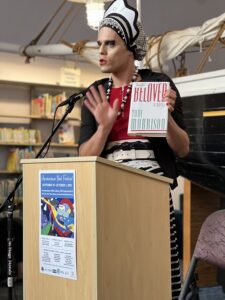
Hutchinson then introduced Jizzelle, the self-proclaimed tallest queen in Provincetown, with her flowing pink sequined dress, thick eyelashes, and tall blonde hair. “I know I look stunning and perfect, but we all have our flaws,” she said before pulling out a pair of reading glasses for an excerpt from The Glass Castle by Jeannette Walls. Jizzelle said that, though the book isn’t about LQBTQ youth, she related to the unconventional, and at times abusive, parenting in Walls’s story. “I see a lot of Jeannette’s parents in my parents,” she said.
Hutchinson returned to the microphone and read an excerpt from a book she said she had read in high school, Year of Wonders by Geraldine Brooks, the story of a housemaid who emerges as a healer in the 1666 bubonic plague. “Is the problem that women are doing science?” Hutchinson joked, while Cinnater chimed in that it was in fact banned for “witchcraft, madness, and repressed sexuality.”
May Haps, in a sheer turquoise dress layered with feathers, read the children’s book Jacob’s New Dress by Ian and Sarah Hoffman, illustrated by Chris Case. The book tells the story of a boy making a dress to wear to school. Haps told her own story of putting on the Christmas tree skirt and dancing around the house in it when she was four. “Oh, and it fit, honey,” she said. She described her father coming home and reprimanding her. “I couldn’t understand why he didn’t find the beauty, the joy,” she said.
Hutchinson concluded the reading with a heartrending passage from the Pulitzer Prize-winning and often banned book Beloved by Toni Morrison.
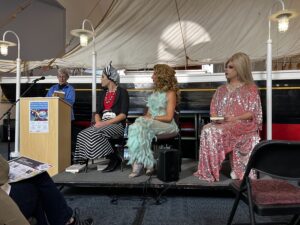
The three queens agreed that banning drag and books under the guise of protecting children is a political “dog whistle.” Jizzelle said she doesn’t allow or want children at her drag showcases, and that it is ludicrous that people “think we’re grooming kids.” Haps added, “But we would love to brush their hair!”
Cinnater said that supporting the local library and fighting for a ban on book banning itself is a way to resist censorship. In July, state Sen. Julian Cyr introduced a bill (SD2673) that would set stricter standards for book removal in schools and have the state adopt the ALA’s Library Bill of Rights. It states that libraries “should challenge censorship in the fulfillment of their responsibility to provide information and enlightenment.”



